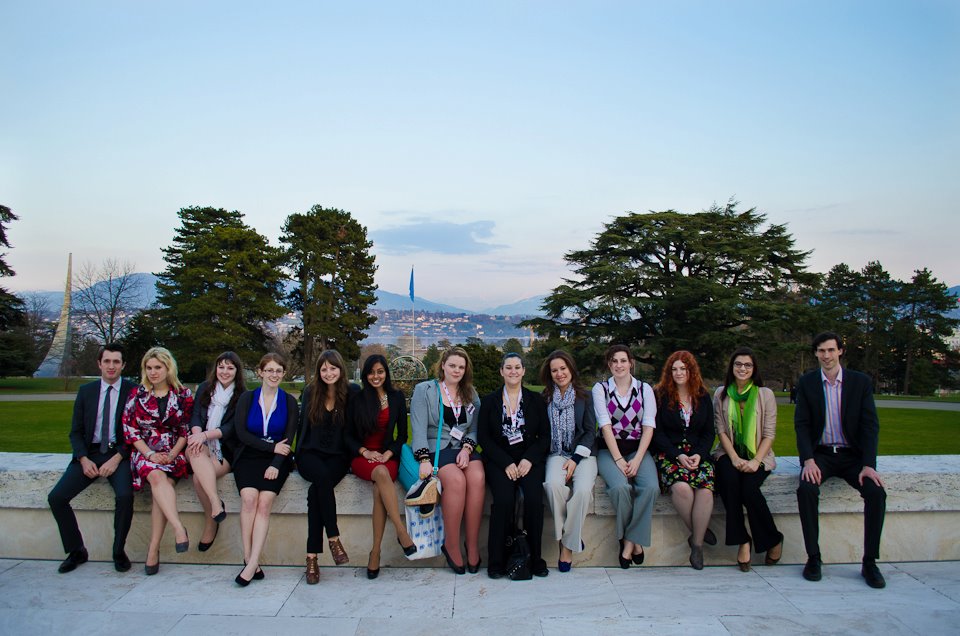
The Pace University New York City Model United Nations delegation to the 2012 Geneva International Model UN conference, in the gardens of the UN Palais des Nations. Left to right: Michael Zona '13, Katie James '14, Elena Marmo '15, Cassandra Stimpson '13, Abby Lee '13, Krupa Patel '12, Asia McDougle-Stamey '13, Amanda Corsaro '12, Aydde Martinez '07, Miranda Ronghi '12, Jean Dorak '13, Kimberly Alonso '13 and Dr. Matthew Bolton . Photo by Francis Mayne for GIMUN.
Educating for global citizenship is one of Pace University‘s top priorities. At the Geneva International Model United Nations (GIMUN) conference in Switzerland last week, Pace students explored what it might mean to be a global citizen in the auspicious committee rooms of the Palais des Nations – former League of Nations headquarters and current location of the UN Office at Geneva.
The Pace University New York City delegation won three awards for its dedicated engagement in discussions on key contemporary issues of conflict, aid, human rights and eradicating poverty. The GIMUN conference mirrored its 2012 theme of “Achieving Dialogue and Development through Cultural Diversity.” Participants hailed from 49 countries and committee sessions were simultaneously translated between French and English. For more information on GIMUN, read this interview with Nicolas Vetterli, president of GIMUN.

Kimberly Alonso '13 (center) listens to simultaneous interpretation of the proceedings of the UN Development Programme committee at the 2012 Geneva International Model UN conference.
“It was truly remarkable to be immersed in a conference marked by cultural diversity, in a city such as Geneva,” said Katie James ’14, a Pace NYC Model UN head delegate who represented CARE International in a simulation of decisionmaking in the UN Development Programme (UNDP). “Being surrounded by people from all over the world, debating and analyzing universal topics summed up what it means to be a global citizen.”
Also in her committee were Abby Lee ’13, who represented Sweden and Kimberly Alonso ’13, representing Japan.
To learn more about Katie, Abby and Kimberly’s work at the conference, click here. They considered issues of poverty and development, a topic which was also examined from a financial perspective in the conference’s Economic and Social Council (ECOSOC), where Cassandra Stimpson ’13 and Elena Marmo ’15 were both recognized with “Special Mention” awards. For more on Cassandra and Elena’s award-winning contributions to the conference, click here.
GIMUN differs from other Model UN conferences by having students participating as translators, bloc representatives and journalists, as well as delegates of member states. It is also highly selective; aspiring delegates had to apply individually to attend. According to the GIMUN recruitment team, only 183 of 390 applicants were invited to come, based on “criteria including experience, motivation, dynamism, leadership, creativity and openness.”

Delegates in the Human Rights Council, including Jean Dorak '13 (middle row, second from right), applaud progress in their deliberations at the 2012 Geneva International Model United Nations.
“Crises, conflicts and even successes cross borders and affect every individual directly and indirectly,” said head delegate Krupa Patel ’12, who represented Palestine in simulated discussions of norms on pre-emptive war and the legal status of people displaced by climate change in the UN General Assembly’s Legal Committee. “GIMUN gave me a firsthand experience of this and helped me to start to build a new meaning for being a citizen of the world.”
Issues of international law were also central to the work of Jean Dorak ’13, who represented Jordan in the GIMUN’s Human Rights Council (HRC) and head delegate Amanda Corsaro who represented Togo in the Security Council.
To learn more about Krupa, Jean and Amanda’s work at the conference, click here.
Model UN teaches one to see “Being put in the middle of two diametrically opposed sides” as an opportunity “to bridge the divide and to play consensus builder,” said head delegate Michael Zona ’13, who represented India in discussions on religious freedom and the rights of indigenous people in a simulation of the United Nations Social, Cultural and Humanitarian (SOCHUM) committee. Also in his committee were Miranda Ronghi ’12 — who was recognized with a “Special Mention” award for her representation of Peru — and Asia McDougle Stamey, who represented Indonesia. To learn more about Michael, Miranda and Asia’s work at the conference, click here.
Located only two express subway stops from the iconic United Nations complex on the East River, Pace University’s New York City Model UN program has a 60-year history of excellence in regional, national and international conferences. Model UN at Pace is uniquely integrated into the Political Science curriculum within the Dyson College of Arts and Sciences.

Dr. Matthew Bolton, Pace University's New York City Model United Nations adviser talks strategy with head delegate Katie James '14, in the plaza outside the UN's Palais des Nations in Geneva.
“Participating in a Model United Nations class at Pace offers an opportunity for students to learn vital global policymaking career skills in an experiential and participatory way,” said Dr. Matthew Bolton, Pace NYC Model UN adviser and assistant professor of political science. “It teaches students about public speaking, negotiation, mediation and writing in a rigorous simulation of international deliberations about peace, security, development, human rights and trade.”
In recent years the program has won recognition at prestigious conferences for the team’s ability to cogently analyze complex global issues, engage articulately in policy debate and propose compelling solutions. In 2011, the team took home the most awards (tied with another university) from the North American Model UN conference in Toronto, as well as the most awards from the National Model UN (NMUN) conference in Washington DC. Next week (1-5 April), students in the program will participate in the NMUN conference here in New York City.
“Model UN has made me a better person,” said head delegate Amanda Corsaro ’12. “It has helped me grow to be an independent, intelligent, strong woman, giving me a voice in a world where women’s voices are usually not heard or listened too.”
